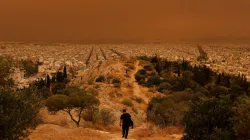The Greek authorities issued a health advisory on Wednesday after Athens had been blanketed by dust clouds from the Sahara desert for the past two days. The Health Ministry advised the public to stay indoors, to abstain from physical activity outdoors, to avoid areas with traffic congestion, and to keep windows and doors closed.
Dust clouds are a mixture of sand and dust that come from the Saharan desert, blown by strong winds and travelling large distances, covering the atmosphere in an orange, grey, or reddish film. On Wednesday, the greater Athens region was covered in a grey haze, while on Tuesday the sky turned an eerie orange hue.
VIDEO: Sky over Athens turns orange under Sahara sandstorm
"Everything was orange"
"Everything was orange, it really felt like we were in the Sahara, we were waiting for camels to pass by," said 19-year-old Eleni, a local resident. "I felt a discomfort, I tried to deal with it by staying in the house so that the phenomenon did not affect my health further," a 45-year-old man said amid health concerns. Some also said: "Wondering whether we reached on Mars!"
Meanwhile, Athens National Observatory Research Director Vassilis Amiridis said the episode occurs about five times a year on average in Greece. "We have an impact on human health, right, so we have to be careful, do not breathe such air, right, and we have to stay home, basically. There are guidances from the doctors that should be followed, because we observe concentrations that are ten times, 20 times higher than the mean, the average for a region," said Amiridis.
The intensity of the current phenomenon has not been seen since 2018, said Amiridis, and he estimates that the dust clouds travelled some 1,000 kilometres from Africa to Greece. Although the phenomenon can negatively impact health, it does have a positive element, he said - the dust clouds contain nutrients for sea life to feed on in the oceans.
(With inputs from agency)
Also Read: 'Earth's issuing a distress call': UN issues 'red alert' on climate change after record-hot 2023
Latest World News
